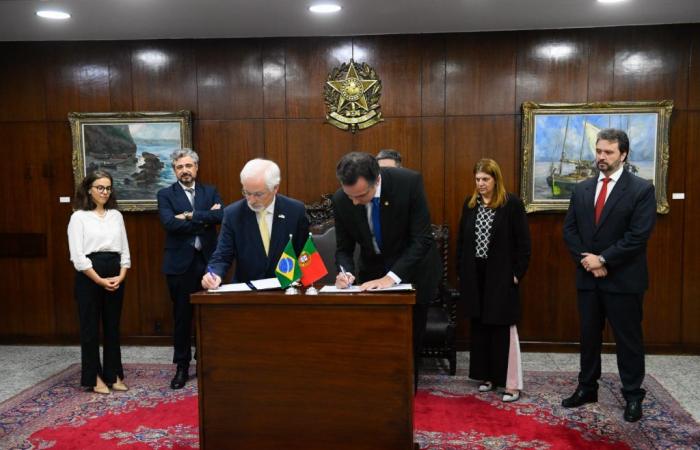The Federal Senate of Brazil, the City Council of Coimbra and the Portugal Brazil 200 Years Association signed, on the 16th, a technical cooperation agreement for the valorization of the Portuguese language and the strengthening of relations between Brazil, Portugal and other Portuguese-speaking countries . One of the consequences of the agreement is the development of projects for the Casa da Cidadania da Língua, opened in October 2023, in Coimbra, Portugal.
The president of the Brazilian Senate, Rodrigo Pacheco, who went to Coimbra to inaugurate the House of Language Citizenship, highlighted that partnership in the cultural field can help to combat cases of xenophobia and strengthen ties between countries.
“The idea of Lusophony is still viewed with suspicion in some circles due to the asymmetry between Lusophone countries and the colonial past that characterized the spread of the language around the world. The formalization of the agreement takes place in a context of strengthening the perception of xenophobia between Brazil and Portugal and criticism of the Brazilianization of the Portuguese language, for example. Here we are celebrating yet another event crowning this extraordinary relationship between Brazil and Portugal”, said Pacheco.
For the president of Coimbra City Council, José Manuel Silva, the deep connection between Brazil and Portugal and the desire to include all nations of the Community of Portuguese Speaking Countries is the motto of this new relationship between the two countries.
“We reiterate the agreement to continue developing the concept of language citizenship. It is an inclusive concept that embraces everyone and wants to involve all Portuguese-speaking countries. We intend to deepen cultural and social relations, the economy, but above all friendship relations and the cultivation of a language that unites us”, reinforced Silva.
For his part, the founder-president of the Portugal Brazil 200 Years Association, José Manuel Diogo, said he believes that cultural exchange is an important way to combat prejudice.
“Today, more than 700,000 Brazilian citizens live in Portugal, where there are many questions, sometimes more in the news than in fact, about problems such as xenophobia. This forces us to be assertive. There has to be a rapprochement between culture, mutual knowledge of the culture of Portugal and Brazil so that these problems can be resolved. It is a historic movement of decolonization”, pointed out José Manuel Diogo.
According to what we learned, the objectives of the agreement are “technical-scientific and cultural cooperation and the exchange of knowledge, information and experiences for the promotion of literary and academic publications and cultural and scientific activities”. The focus is also on “valuing, recognizing and disseminating the Portuguese language as a vehicle for integration and cultural expression”, among other topics.
Goals include at least two annual cultural events that celebrate the diversity of Lusophony, including festivals, exhibitions and concerts; academic programs that reach at least 500 participants per year; and the annual publication of at least two relevant literary or academic works in the Portuguese language. Cooperation in the organization of at least one international conference, the development of an online technological platform for the promotion of the Portuguese language and a specific program to support and promote the work of Portuguese-speaking women writers, seeking gender equality in the literary and cultural.
Remember that the Casa da Cidadania da Língua proposes to be a space to “debate, study, open borders and create a new relationship between Portuguese-speaking countries, with a decolonizing approach”. The idea of “language citizenship” is, according to those responsible, “to give a sense of belonging and identity beyond territories and legal borders and to bring reflections on the need to recognize the diversity of tones, accents and histories of the language and its Portuguese speakers”.
Igor Lopes
Tags: Entities Coimbra joined Brazilian Senate Portuguese language Gazeta Rural
--





